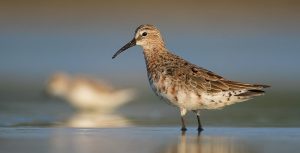As the UN Biodiversity Conference in Colombia enters its final days of negotiations, new IUCN Red List update reclassifies 16 shorebird species to higher threat categories.

According to the report, some populations of migratory shorebirds have decreased by more than a third.
BirdLife International, with partners spanning 119 countries, has called on governments at CBD COP16 to step up urgent actions for species to reverse declines and stop extinctions.
Indeed, the latest update to the IUCN Red List of Threatened Species™ reveals a highly concerning decline in populations of migratory shorebirds across the globe, with 16 species reclassified to higher threat categories.
Science shows the huge negative impact of declining species populations, with whole ecosystems and food chains being disrupted as a result. As birds migrate beyond borders, the new update highlights a need for more collaboration from governments without delay to reverse the losses of migratory birds.
Martin Harper, CEO, BirdLife International, said: ‘‘COP16 must be the catalyst for governments to back up commitments made two years ago with meaningful action to reverse the catastrophic declines in species populations. This means more action to bolster efforts to recover threatened species, more action to protect and restore more land, freshwater and sea, and more action to transform our food, energy and industrial systems – backed up by the necessary funding. The decline of migratory birds, which connect people across countries and continents, is a powerful symbol of how we are currently failing.’’
Birds are important indicators of the state of nature: they occur almost everywhere, their behaviours and ecology often mirror other groups of species, they are extremely well studied, and they are responsive to environmental change. With one in eight bird species threatened with extinction and 60% of bird species in decline globally, diminishing bird populations signal ecosystems in crisis. Many migratory birds follow specific routes called flyways3, stopping at various sites along the way to rest and feed. This makes them especially at risk from threats like habitat loss and climate change.
Dr Ian Burfield, Global Science Coordinator (Species) & Bird Red List Authority Coordinator, BirdLife International, said: ‘‘While many of these shorebirds remain numerous and are still commonly encountered along their flyways, new analyses of data from long-term monitoring schemes reveal that the global populations of some species have declined by more than a third in recent decades. In some cases, the rate of decline is accelerating – underlining the urgent need for research to diagnose the causes and coordinated conservation action to address them.’’
Shorebirds, often seen darting along beaches or feeding on mudflats, are a familiar sight all over the world. Coastal areas where many of these birds live also support millions of people by providing food, jobs, and storm protection. Protecting shorebirds is essential not just for the birds, but also for the coastal communities that depend on these habitats.
Dr Barend van Gemerden, Global Flyways Coordinator, BirdLife International, said: ‘‘The perilous declines of migratory birds are a sign that the integrity of flyways is deteriorating. Losing the network of habitats that migratory birds depend on to rest and feed during their long journeys could have severe consequences for the millions of people that rely on these sites, as well as the birds.’’
BirdLife International submitted: “We only have five more years of this defining decade. CBD COP16 is the moment to galvanise action to halt and reverse nature loss by 2030. Plummeting migratory bird populations signal that nature is in crisis. When we lose species, our future is compromised. Nature loss can be reversed but extinctions cannot.”
